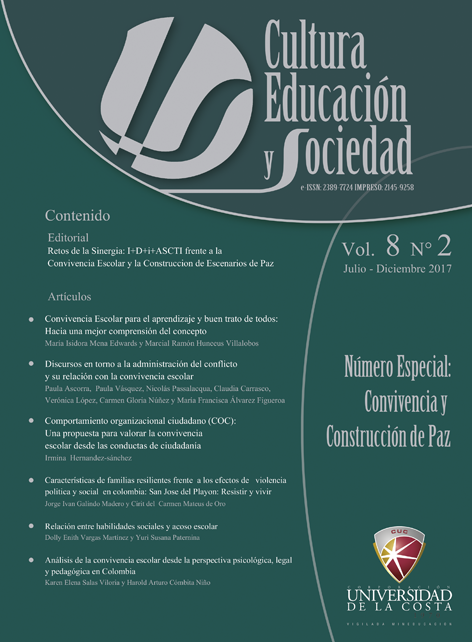Characteristics of resilient families against the effects of political and social violence in Colombia: San Jose del Playón: Resist and live
DOI:
https://doi.org/10.17981/cultedusoc.8.2.2017.04Keywords:
Families; resilience, political violence; ColombiaAbstract
The effects of political and social violence in Colombia are evident in the voices of the victims who
have experienced its effects, the trend of the investigations has been linked to the description of the traumatic traces of violence and this has made it possible to visualize the dimensions of the conflict, recognizing the resilient tools that subjects and families have developed in the face of traumatic events, it becomes a possibility to understand dynamics that allow us to face these experiences. This document describes the results of an investigation that characterizes resilient families in the face of political and social violence in Colombia, a qualitative study was proposed with a case study design, the level is descriptive. The case of the families of the population of San José del Playón in the department of Bolívar is described, in the middle of a context of constant confrontations by the armed actors, a forced displacement of the population is generated, some families decide not to move and stay in their homes in the shadow of death. The results describe the resilient tools in the context of coexistence with armed groups as those actions that were achieved when violent groups left the area.
Downloads
References
Aristizabal, A. C. (2013). Como nos empezo la violencia . Contexto, Uiversidad Pontifiicia Bolivariana, 3.
Bello, M. (2003). El desplazamiento forzado en Colombia: Acumulacion de capital y exclusion social. Revista aportes Andinos,Globalizacion, migracion y derechos humanos .
Gomez, E. (2010). Resiliencia Familiar un enfoque de investigacion e intervencion con familias multiproblemicas . revista de Psicologia , 103- 126 .
Gonzalez, C. (2004). Transformacion y resiliencia en familias desplazadas por la violencia en Bogota. Revista de estudios sociales, 223- 230.
Grotber, E. (1995). Una guia para la promocion de la resiliencia en niños. The Bernard van Leer Fundation .
Hawley. (1996). Toward a definition of family resilience: integrating life span and family perspectives. Family process, 35-23.
Historica, C. N. (2013 ). Informe General del grupo de memoria historica. Basta Ya¡. Bogota.
Lopez, L. (2007). Desplazamiento forzado en el oriente Antioqueño, estrategias familiares de sobrevivencia. Medelliin: Comfenalco.
Lopez, O. L. (2013). Efectos y reacciones de las familias frente al desplazamiento forzado en Colombia . En C. O. Laguado, Familia (págs. 265-281). Medellin: Coorporacion de Investigaciones Biologicas.
McCubbin, M. (2002). Family Resiliency in Childhood Cancer. Family Relations, 103-111.
Meertens. (1999). Desplazamiento forzado y genero: Trayectorias y estrategias de reconstruccion vital,. Bogota: Universidad Nacional.
Mujeres, R. p. (2013). La verdad de las mujeres en el conflcito armado Colombiano. Ruta pacifica de las mujeres.
Palacion, A. M. (1999). Estres post traumatico y resistencia psicologica en jovenes desplazados. Investigacion y desarrollo, Vol N10.
Roja, C. (2009). Desplazamiento forzado en conflictos armados: Responder a los desafios . Ginebra: CICR.
Unidas, N. (1998). Principios rectores de los desplazamientos Internos . Naciones Unidas .
Universal, E. (25 de 02 de 2014). Habitantes de San Jose del Playon bloquena la via .
Walsh. (2004). Resiliencia familiar. Estrategias para su fortalecimiento. Buenos Aires: Amorrortu editores.
Walsh, F. (1988). El concepto de Resiliencia familiar: crisis y desafío. Sistemasfamiliare, 11.
Walsh, F. (2005). Fortalecendo a resiliencia Familiar. Sao Paolo : Roca.
Yunes, M. (2003). Psicologia positiva e resiliencia: o foco no individuo e na familia. Psicologia em Estudo, 1- 15.
Downloads
Published
How to Cite
Issue
Section
License
Copyright (c) 2017 CULTURA EDUCACIÓN Y SOCIEDAD

This work is licensed under a Creative Commons Attribution-NonCommercial-NoDerivatives 4.0 International License.
![]()
Creative Commons 2020 CULTURA EDUCACIÓN Y SOCIEDAD
This article is under international license Creative Commons Reconocimiento-NoComercial-SinObrasDerivadas 4.0.
The published articles are the sole responsibility of their authors and do not necessarily reflect the opinions of the editorial committee.
CULTURA EDUCACIÓN Y SOCIEDAD respects the moral rights of its authors, who assign to the editorial committee the patrimonial rights of the published material. In turn, the authors inform that this work is unpublished and has not been previously published.
All articles are under a:
Licencia Creative Commons Atribución-NoComercial-SinDerivadas 4.0 Internacional.
![]()


 English
English
 Español (España)
Español (España)




_12.53_.27_p_. m_._3.png)





_12.57_.35_p_. m_._3.png)
_12.50_.37_p_. m_._3.png)



